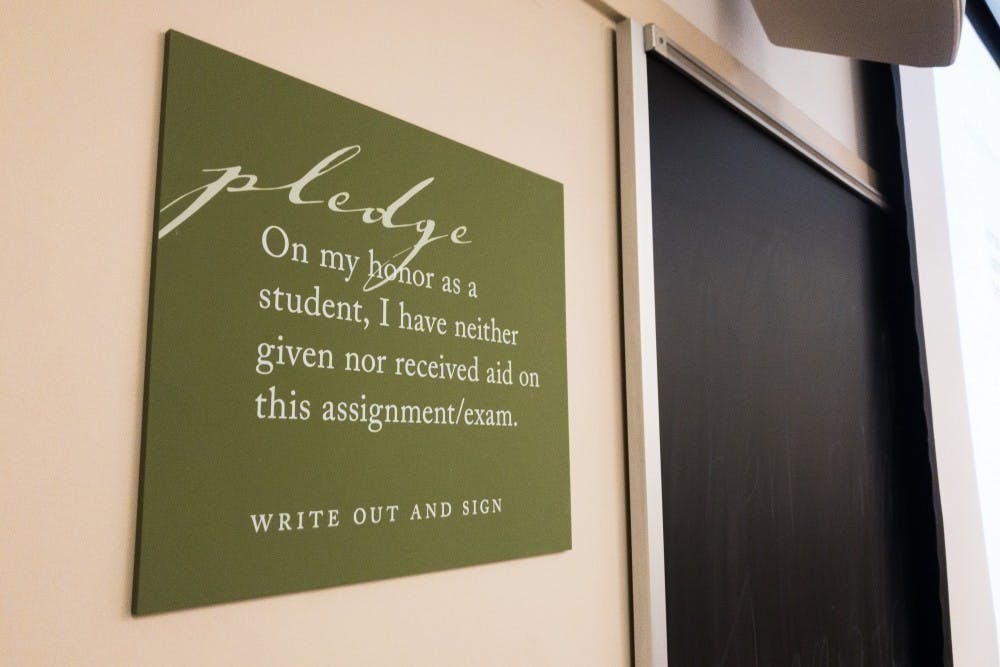While the Honor Committee is one of the University’s hallmark student-self governance institutions, conflict over amending its constitution has come to a head once again. Several new proposals considered by the Committee this fall have asked representatives to consider amending Honor’s historic single-sanction system — expulsion could finally be taken off the table. In the words of the Committee’s current chair, Honor’s current system “no longer represents or serves the varied student population that inhabits U.Va. today.” However, much of the Committee’s progress this semester has been hindered by attendance issues, as its constitution only currently allows in-person voting and meeting attendance. We call on Honor to amend its bylaws to integrate virtual voting and deliberation — members of the Committee must finalize a proposal that addresses its system’s failings, and time is running out.
Honor’s current single sanction system is ineffective — the severity of expulsion as a sanction dissuades both students and professors from reporting and condemning one another to such a punishment. If the Committee wants students to adhere to the Honor Code because of integrity rather than fear, it must prioritize rehabilitation over punishment. Expulsion benefits no one.
Further, Honor must recognize and respond to the racist disparities in its current reporting system. The Committee has released two reports that both show disproportionate reporting rates against Asian American, international and Black students. Asian American students made up 27.2 percent of all reports, but only 12 percent of the student population during the same time period. Honor cannot continue to support a system that severely punishes students when we know that its reporting system has disproportionately affected marginalized communities.
While several proposals to amend the single sanction were introduced this fall, insufficient attendance and internal conflict prevented any proposal from being passed. Last semester, Honor once faced such low attendance that the Committee was even prevented from working through its agenda, as quorum is needed for many decisions. In order for a referenda to be brought to a student body-wide election — and potentially become a part of Honor’s constitution — it must either pass Honor internally or be signed by 1,250 students independently.
The Honor Committee must listen to its members, who have already asked for Zoom alternatives. Last fall, a large number of Committee members sent a letter to leadership requesting a virtual option for meetings and votes, but the Executive Committee failed to respond. If Honor hopes to embrace the substantive change its representatives promised students, the Committee — and in particular, its executive members — must embrace virtual meeting alternatives. As the world approaches its third year of the COVID-19 pandemic, it is insensitive and out-of-touch to expect every member of the Committee to attend in-person weekly, particularly given increasing case counts among the student body.
As it stands, Honor’s current system inhibits effective student self-governance. Committee members need sufficient accessibility to attend meetings so that proposals can be finalized and voted on. Members of the Honor Committee, you have a duty to serve the student body that elected you and deliver on campaign promises. Finalizing a proposal to be put forth to students this spring is just one step the Honor Committee can take towards becoming equitable and remaining relevant. There are two weeks left before the University Board of Elections’ Feb. 5 deadline to submit referenda — time is running out for the Honor Committee to deliver on the substantive change its representatives purported to support when the students elected them last year. The Committee must take substantive measures towards creating a system that better supports the mutual respect and honesty it aspires to foster within the University community.
Should Honor fail to internally pass a proposal by the UBE deadline, there is another pathway students can use to bring change to the Honor system. Referenda can also be brought to a student body-wide vote if a petition in favor receives 1,250 signatures. In keeping with the University's unique tradition of student self-governance, we must take action against inequities on Grounds and prove exactly what wearing the “honors of honor” means.
The Cavalier Daily Editorial Board is composed of the Executive Editor, the Editor-in-Chief, the two Opinion Editors, their Senior Associate and an Opinion Columnist. The board can be reached at eb@cavalierdaily.com.







